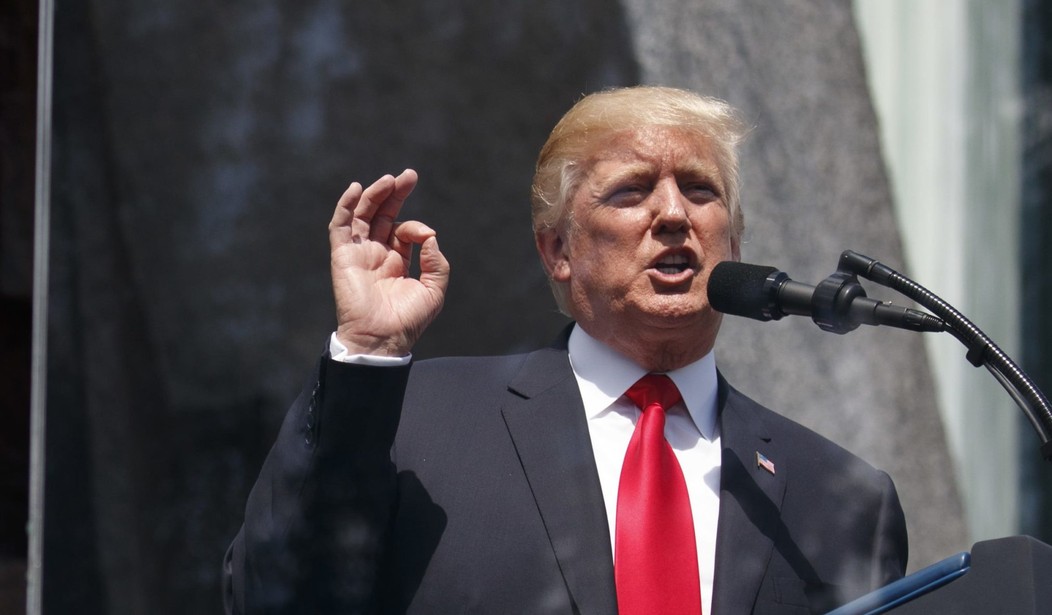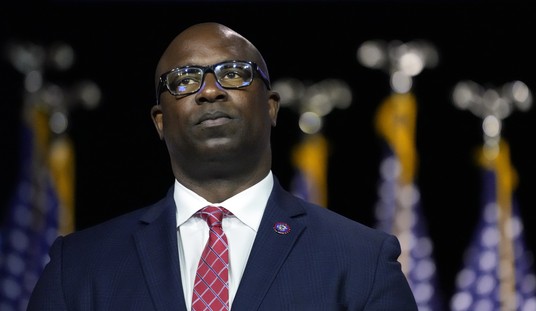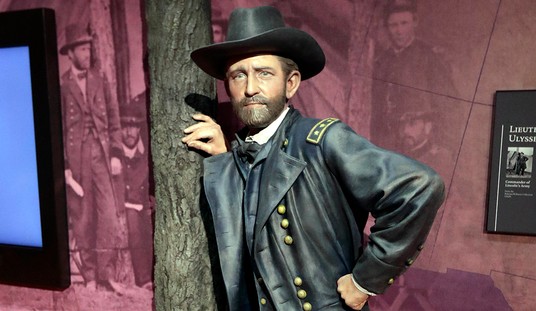One the strangest features of our political life in the United States today is the reckless abandon of our rhetoric. “Oh, that’s because Donald Trump has debased political discourse,” you say. “He calls women ‘dogs,’ he refers to Kim Jong-un as ‘Rocket Man,’ he says the press is ‘fake news’ and the ‘enemy of the people,’” etc., etc.
But that’s not the whole story, is it? Some diligent scribe should do a little historical digging and tabulate where, in each case of rhetorical Trumpery, the insults and opprobrium started. Did Donald Trump start the abuse? Or did his targets open hostilities?
In many, maybe most (maybe all) cases I suspect you will find that Trump’s invectives were rejoinders, i.e., responses to earlier provocations and expressions of contempt. Trump made fun of “low-energy Jeb,” but wasn’t that after Jeb said some pretty disagreeable things about Trump?
In any event, however the matter of precedent shakes out, there is also the issue of extreme rhetoric feeding extreme feelings and extreme actions. Simply put, the anti-Trump chorus has worked itself into a frenzy of trembling rage and hysterical overstatement. Trump is Hitler (literally); his behavior is “treasonous” (or, as The New York Times put it, he is a “treasonous traitor”); he is a “fascist,” a “moron,” a “tyrant” who (as tyrants tend to do) is taking the United States down “the path to tyranny.” Et very much cetera.
Now in one sense this is just business as usual when a Republican is in office. Every GOP president going back at least to Nixon has been compared to Hitler. If Hitler hadn’t existed, the Left would have had to invent him. Even squeaky clean Mitt Romney was Hitler for a Day, an evil man who (maybe) once bullied a classmate in high school and later put the family dog in a cage on the roof of his car. Horrors!
All this is well-trod ground. If you’re conservative, you’re evil by definition and its open season as far as the mainstream media is concerned.
But the reaction to Donald Trump, although it began by following this playbook, has mutated into something different and more toxic.
One expression of that toxic difference is the cabal of former high-ranking government officials who, in a marked departure from past practice, have embarked on very public campaigns against the president. One thinks of jabbering John Brennan, Obama’s head of the CIA, for example. Brennan’s incontinent ravings on Twitter and on MSNBC have been as embarrassing as they are alarming. James Clapper, Obama’s director of national intelligence, has not been far behind in his commentary at CNN. And then there is the smarmiest of them all, Obama’s FBI director, the moist James Comey, who wrote a bestselling book about how noble and high-minded he is and how horrible and misguided is President Trump.
Once upon a time, and it was not a long time ago, people who had been entrusted with such august responsibilities would have maintained a dignified silence upon leaving office. Donald Trump has catalyzed them (as he has catalyzed Hillary Clinton) into an embarrassing emunctory garrulousness. (There is also the little matter of lucre: those contracts with CNN and MSNBC, those book advances and royalties.)
But there is something else, something darker and more twisted, at work here. In the Republic, Socrates notes that while many people may lie with abandon, the one thing no one can countenance is the “lie in the soul” that makes it impossible to distinguish reliably between truth and falsehood.
I suspect that anti-Trump hyperbole has insinuated such a reality-distorting lozenge into the hearts of many of the anti-Trump brethren.
Examples are legion, but let me offer just one, by Eliot Cohen, the crusading neo-conservative, from “How This Will End,” his most recent essay for The Atlantic. The column carries the sub-head “Sooner or later, tyrants are always abandoned by their followers.” “Tyrants,” forsooth.
Authors often are not responsible for the titles or headings that are attached to their pieces. But in this instance the headings accurately reflect the tenor of the column. According to Cohen, Donald Trump is a “tyrant” who will eventually (and probably soon) be abandoned by his disillusioned followers.
Cohen begins his exposition by recalling Watergate and the disintegration of the Nixon administration and isolation of the president.
Comparisons between Watergate and whatever unholy grail Robert Mueller is pursuing have been a staple of anti-Trump commentary since the investigation began. I think the comparison is strained and unconvincing, but it has become a standard trope and no one at this point can blame Eliot Cohen from inserting it as a throat-clearer at the beginning of his column.
But the comparison with Nixon is just the warm-up. The personage that Cohen thinks Trump really resembles is Macbeth, the regicide tyrant and usurper, the murderer of the families of rivals and all-round power-mad evil doer. Just like Macbeth, Cohen suggests, Trump will find himself scorned and abandoned by his followers. Actually, for Cohen, Trump is much worse than Macbeth, who at least was “faithful to his wife, has a conscience (that he overcomes), knows guilt and remorse, and has self-knowledge. He also has a pretty good command of the English language. In all these respects he is as unlike Trump as one can be.” Okee-doke.
“Really [to] get the feel for the Trump administration’s end,” Cohen writes, “we must turn to the finest political psychologist of them all, William Shakespeare.” Cohen then quotes this bit:
Those he commands move only in command,
Nothing in love. Now does he feel his title
Hang loose about him, like a giant’s robe
Upon a dwarfish thief.
It would be interesting to ask Mike Pompeo or John Bolton or Jim Mattis about this characterization.
But more revelatory, though inadvertently so, is Cohen’s comment that if “for the moment . . . the Republicans will not turn on Trump” it is because “they fear a peasant revolt.” A “peasant revolt,” you see, a revolt of all those “deplorable” and “irredeemable” people that finer folk like Eliot Cohen somehow and mistakenly entrusted with the franchise.
They—we—voted the wrong way but the tyrant, Trump, will soon disintegrate and then the rats (that would be us) will crowd along the gangways to abandon the ship. Once Eliot Cohen gets going, he really lets it go. Donald Trump is not only worse than Macbeth, he is slotted for something worse than Mussolini’s fate, too. Musso “at least had his mistress, Claretta Petacci, with him at his ignominious end,” Cohen writes, but “Melania’s affections are considerably less certain.” What the hell does Eliot Cohen know about Melania Trump?
Anyway, in his fevered dream, “This is going to happen to Trump at some point,” Cohen predicts. He then quotes from the end of Macbeth where Macduff taunts the king before their final battle. If he won’t fight, then he will be humiliated and “Live to be the show and gaze o’ th’ time./ We’ll have thee, as our rarer monsters are,/ Painted upon a pole, and underwrit / ‘Here may you see the tyrant’.”
This, according to Eliot Cohen, is how the Trump administration is likely to end, “as Americans gaze back and wonder how on earth this rare monster, now deposed, ended up as their president.”
What do you think of Cohen’s analysis and prognostication? I think it is insane. It possesses a certain dramatic urgency, granted. But it is based on a surreal misreading of what President Trump has actually done. Unlike Macbeth, he has not murdered anyone to become or remain our leader. He was elected in a free, open, and democratic election.
Think about it: Trump has actually governed not as a tyrant but as an energetic democrat. Under his watch, the economy is booming, unemployment is at historic lows, consumer confidence is skyrocketing. He has made scores of enlightened judicial appointments and is on the threshold of rescuing the Supreme Court from its long flirtation with with radical jurisprudence. He has taken major steps to rebuild our military, roll back the regulatory state, and reassert the prestige of the United States on the world stage.
I suspect that, come 2024, when President Trump completes his second successful term, Americans will indeed look back, but to the election of Barack Obama and the prospect of a second President Clinton in 2016. They will then wonder how they could have been so misguided as to have elected a naive, anti-American race-hustler like Barack Obama not once but twice, and they will thank their lucky stars that they dodged the bullet of a Hillary Clinton administration, which would have completed the anti-freedom agenda of the deep state and assured generations of economic lassitude and dependency.
Cohen is correct that Shakespeare is relevant to the Trump administration. But the pertinent play is The Tempest, not Macbeth. In Act II, a few of the shipwrecked men are taking stock of their situation on Prospero’s enchanted island. It soon becomes clear that the island appears very different to different characters:
ADRIAN: The air breathes upon us here most sweetly.
SEBASTIAN: As if it had lungs and rotten ones.
ANTONIO: Or as ’twere perfumed by a fen.
GONZALO: Here is everything advantageous to life.
ANTONIO: True; save means to live.
SEBASTIAN: Of that there’s none, or little.
GONZALO: How lush and lusty the grass looks! how green!
ANTONIO: The ground indeed is tawny.
SEBASTIAN: With an eye of green in’t.
ANTONIO: He misses not much.
SEBASTIAN: No; he doth but mistake the truth totally.
As the play unfolds, it becomes clear that Gonzalo sees the world aright while Antonio and Sebastian are caught in the grip of a fevered delusion. Their animus and hatred blinded them to reality. The increasingly fanatic and hysterical anti-Trump chorus would do well to reflect on that phenomenon. Their hyperbole has begotten an alarming disconnection from the real world of solid political accomplishment. The situation is pitiable as well as contemptible. But the malignancy of their vituperation disarms pity before it can even engage. All that is left is contempt, leavened by anger.








Join the conversation as a VIP Member